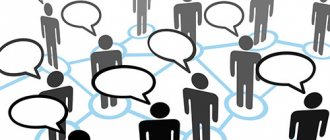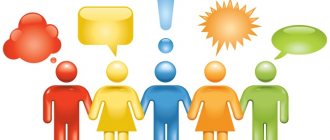A modern person strives to be successful everywhere - both at work and in his personal life. Career, family, friends - all these are components of life, and effective communication allows you to improve all areas and come to maximum agreement. Everyone should strive to improve their social skills. Even if difficulties arise initially, over time this knowledge will bring well-deserved results - reliable interpersonal connections.
Definition of communication
Different ways of transmitting information from one person to another are called communication. It includes all the variety of channels for transmitting and decoding signals and can be:
- verbal;
- non-verbal;
- written;
- pictographic;
- spatial-symbolic, etc.
Communication is considered effective when the sender of information communicates on the same wavelength as the recipient. However, even communication in a single sign system does not guarantee that the message will be correctly deciphered.
Effective communication minimizes the loss of meaning of the message. To successfully promote a business, to maintain friendships, and for a vibrant personal life, it will be useful for any person to improve their communication skills.
Habit 3: Stay in control
To communicate effectively, you need to be aware of your emotions and control them.
And this means learning to cope with stress. When you are nervous or unable to cope with your emotions, you are likely to misperceive other people, send confusing or intimidating nonverbal signals, and begin to act like an unstable, mentally ill person. How many times have you experienced a disagreement with your spouse, children, boss, friends or co-workers and then said or done something you later regretted? If you can quickly de-stress and calm down, not only will you not have to regret it later, but in many cases you will help the other person cool down as well. Only when you are in a calm, relaxed state will you be able to understand whether you need to respond in this situation or whether it is better to remain silent, as indicated by the behavior of the other person.
In situations such as a job interview, a business presentation, a stressful meeting, or introducing a loved one to family, for example, it is important to manage your emotions, think on your feet, and communicate effectively under pressure. These tips may help:
Basics of Effective Communication
Communication as a banal exchange of information is already present in the simplest animals. Man, in the process of evolution, has brought communication to perfection. Spoken and signed speech developed and gradually expanded to written, symbolic and figurative. However, this process has made understanding more difficult, and effective communication is becoming a separate object of study.
The communication process includes five elements:
- A communicator is someone who conveys information.
- Contents of the message.
- The method of transmitting information (how it is carried out).
- The audience, or recipient, is who the message is intended for.
- The final stage of communication, which allows us to understand whether effective communication has taken place. It is only possible if the previous four are sufficiently satisfactory.
Principles of Effective Communication
Without positive communication, it is impossible to achieve mutual understanding on any issue. In order to make sure that other people correctly perceive outgoing information, it is necessary to comply with a number of requirements.
First of all, you need to pay attention to the principles of effective communication:
- Communication should be two-way. When all participants are interested in the positive outcome of the conversation, and it is equal for them, the desired effect occurs.
- The recipient must make every effort to correctly perceive the message.
- The message must be clear, structured and concise.
- The recipient must trust the speaker, respect his opinion and not question his competence.
- Effective communication is always emotional, to the extent that is acceptable in a given situation.
- Patience and forbearance towards other people's shortcomings. Accepting people as they are, without trying to adjust or fix anything.
Below we will discuss the main conditions for effective communication.
What rules of communication do you try to use in your life?
Psychologists recommend the following set of communication rules for every day:
- Show genuine interest in other people.
- Smile.
- Remember that for a person, the sound of his name is the sweetest and most important sound of human speech.
- Be a good listener. Encourage others to tell you about themselves.
- Talk about what interests your interlocutor.
- Make people feel important to you and do it sincerely. This rule is the most important!
What rules of communication between people do you know, and which do you try to use in your life?
Please share in the comments. Yabrova Ksenia May 16, 2021
How to achieve a positive effect from communication?
For communication to be considered effective, certain conditions must be met:
- Speech must correspond to the original purpose of the conversation and be adequate. Don't talk too much or bring up issues that have nothing to do with the topic being discussed. This improves effective communication skills.
- The words used must be logical and lexically accurate; this is very important to achieve the goal of communication. Achieved through constant self-education, reading various literature and careful attention to the native language.
- The narrative itself should be logical and competent. A clear structure of presentation creates favorable conditions for listeners and increases the chances of a positive outcome.
Effective Communication Techniques
Any person lives in society and is dependent on it. Even the most desperate homebodies, perhaps not directly, but enter into interpersonal relationships. Effective communication will be useful both for work and for everyday social connections. Communication techniques and skills can be developed and improved - this will make anyone's life much easier.
Do you want to receive positivity in the process of communication? It will be useful for you to learn some techniques for increasing the effectiveness of communication:
- Learn to listen carefully to what they say. You should not just look at the interlocutor during a conversation, but also bend slightly, nod your head, and ask appropriate leading questions. This technique will allow you to understand the interlocutor’s point of view as accurately as possible.
- Be clear, concise and to the point. The more clearly a thought is formulated, the more likely it is that it will be understood and perceived correctly.
- Include in your arsenal not only verbal, but also non-verbal communication. Take the same position as the interlocutor, try to use only open gestures, and do not touch your face during the conversation.
- Watch for the emotional coloring of speech. It should be moderate, but so much so that the interlocutor understands your interest in the issue.
- Master the techniques of oratory. The ability to master your voice allows you to accelerate the development of effective communication. Clear articulation, correct timbre and adjusted volume will make any message positive.
- Master technical means of communication. Any adult must be able to use the telephone, fax, Skype, and email. Written communication skills should be developed regularly.
These are just basic techniques designed to facilitate and improve interpersonal communication.
“Cooperation is not competition!”
Punctuation marks are automatically added on first reading.
Is it true? But this is not without reason. It happens that the relationship between the client and the performer is not partnership, but rivalry. Distrust, reluctance to take risks and responsibility, fear of “what if they deceive you” on both sides give rise to misunderstanding. This means that cooperation is ineffective. This is a stalemate, far from ideal. You can live in it for quite a long time, but it does not bring satisfaction, moreover, it blocks the possibility of further development. A business partnership is similar to a marriage relationship. Many parallels can be drawn. The only difference is that “marriages of convenience” in business are, as a rule, happier than “marriages” of love or sympathy, if you like.
Before marriage cooperation:
- Adequately assess what you can give your partner and why he is currently interested in you. Will you be able to be interesting to him after N amount of time?
- Determine what you expect from your partner?
- Communicate your expectations clearly and clearly.
- Balance the benefits: is what I give equal to what I receive?
- Are you ready to negotiate and respect your partner?
- Are you ready to work together to further develop your relationship?
Rules for Effective Communication
Any interpersonal communication must comply with certain standards. Their violation leads to a lack of understanding between interlocutors, conflicts and even a breakdown in relationships.
Rules for effective communication:
- Speak the other person's language. This rule should be understood as the need to take into account the level of education, social status, age and other parameters. To be heard and understood, you need to formulate your thoughts based on the characteristics of the audience.
- Prepare to communicate. If the conversation is not spontaneous, you should find out in advance who you are going to meet with and for what reason. Take visual materials and technical aids. Develop a conversation plan.
- Learn active listening techniques to help put your interlocutor at ease and better understand their point of view.
- Speak clearly, moderately loudly and confidently, do not draw out your words, but do not repeat them either.
- When writing a letter, stick to the chosen style.
- Before calling by phone or Skype, make a plan for the conversation and the issues that need to be discussed in advance.
Examples
- Effective communication in conflict. Returning from the army to his parents' house, the son spent the day surrounded by relatives, after which in the evening he got ready to visit close friends. Looking around at the mirror, he heard his father’s demanding voice: “You must be home at 10 pm.” Without stopping what he was doing, the son calmly said: “Forget it, dad. This is already in the past." Conciseness, confidence and calmness in this case were the best way out of a brewing conflict situation, since these are the qualities that are inherent in a mature, independent man.
- Effective communication with children. A very indicative scene from the movie “Gentlemen of Fortune”, when the teacher addresses children who do not want to have breakfast: “Children, breakfast is canceled for today, because we are flying on a rocket to Mars, so take the space spoons in your hands and have a good meal, because We’ll only be back on Earth around lunchtime.”
Adjusting to the children's wishes and subsequent rejection of persuasion, which children are prejudiced against, allowed them to switch their attention and look at the situation from a different perspective.
Ways to communicate effectively
To achieve mutual understanding in the communication process, it is necessary to create conditions and take into account possible methods of effective communication. There are six of them in total:
- Strive to express your thoughts as convincingly as possible. Always keep it brief and to the point, avoid unnecessary verbiage, omissions and possible double interpretations.
- Use terminology and professionalism only when they are appropriate.
- Even in everyday communication, jargon and slang expressions should be avoided, especially when it comes to intergenerational communication.
- Avoid excessive emotional stress, both positive and negative.
- Try to address yourself personally, by name, scientific or military rank, or by uniting a group of interlocutors with a generally meaningful word.
- Always follow the rules of politeness and etiquette.
Nonverbal cues to improve communication
The interlocutors perceive each other not only by ear. Verbal impact can be increased or decreased by a variety of nonverbal cues. Our body sends them out in large quantities, and other people read and interpret them on a subconscious level.
To improve your communication skills, it will be useful to master positive nonverbal reinforcement techniques:
- Always be clean and tidy: even if your clothing does not exactly match the dress code, the overall impression of the conversation will be positive.
- Try to control your facial expressions and emotions. Facial expression should be neutral-positive and react with changes depending on the flow of the conversation.
- Avoid touching your face during a communicative act - this is subconsciously perceived as an attempt to cover your mouth, and accordingly, your statement is false.
- Learn to “mirror” the body position of your interlocutor. It is important to do this delicately, without excessive zeal, so as not to look like a caricature.
- Avoid “closed” poses – crossed arms and legs. This body position indicates an unpreparedness for effective communication. While open palms and a friendly smile can win over any interlocutor.
Recognize the emotional content of words by training the muscles of the middle ear
By increasing the muscle tone of the tiny muscles in the middle ear (they are the smallest in the human body), you will be able to recognize higher frequencies of human speech that convey emotion and better understand the true meaning of what people are saying. Developing these tiny muscles isn't just about focusing entirely on what someone is saying; They can be trained by singing, playing wind instruments, and listening to certain types of music (high-frequency Mozart violin concertos and symphonies, for example, instead of low-frequency rock or rap).











